Comparing Leadership and Management in Operational Context at Corus
VerifiedAdded on 2021/02/19
|11
|3576
|13
Report
AI Summary
This report delves into the operational management practices of the Corus Company, a part of the Tata Steel Group, focusing on the roles and characteristics of both leaders and managers. It defines and compares the responsibilities of leaders and managers, illustrating their functions within various organizational contexts, such as new project implementations and mass recruitment scenarios. The report explores different leadership theories, including situational, system, and contingency leadership, and their relevance to Corus. Furthermore, it examines key approaches to operational management, such as Six Sigma, Total Quality Management (TQM), and Lean Manufacturing, highlighting the roles of leaders and managers in implementing these strategies to achieve business objectives. The report underscores the importance of operational management and the impact of leadership and managerial decisions on the company's performance and overall success. The analysis provides insights into how these factors influence decision-making processes within the organization.
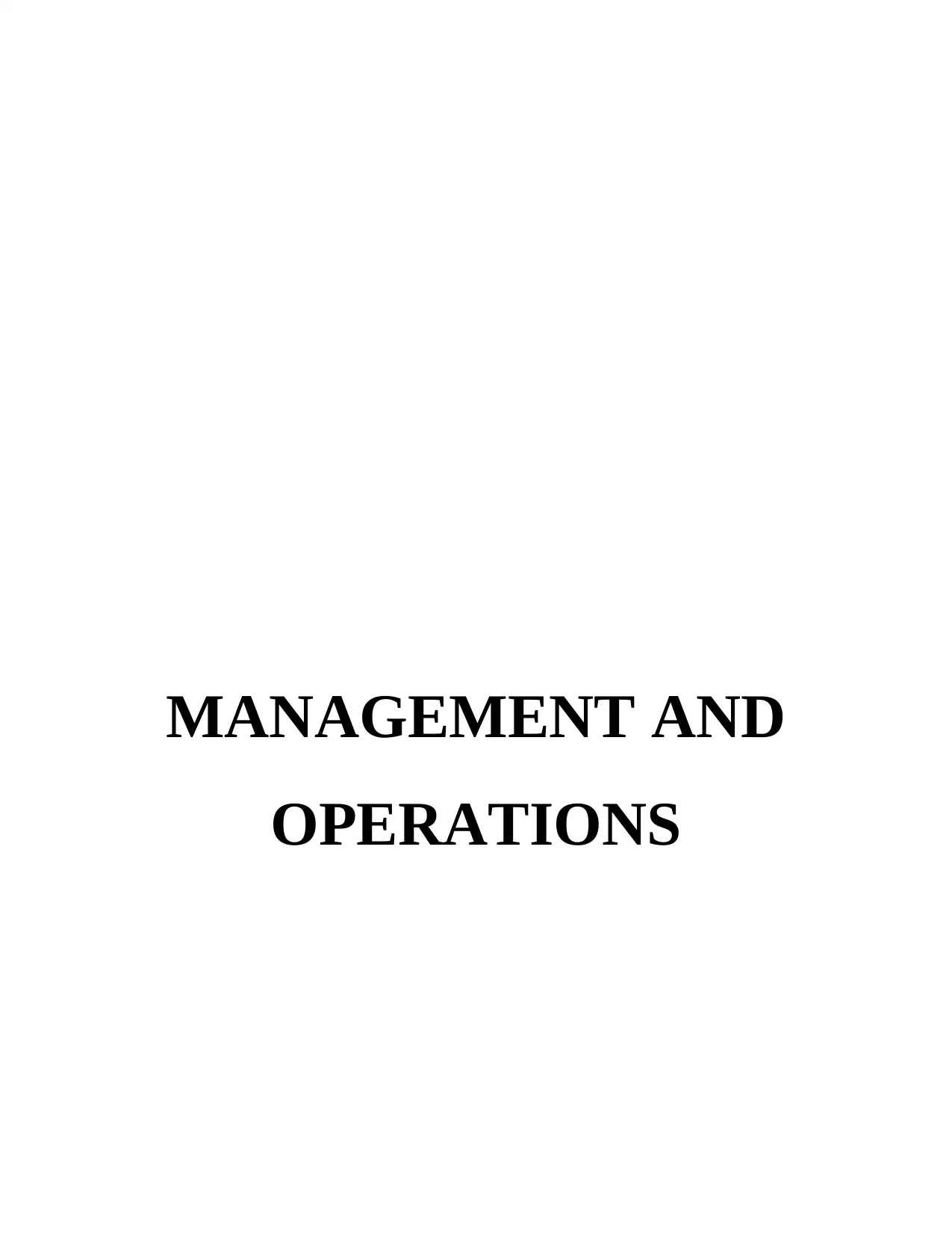
MANAGEMENT AND
OPERATIONS
OPERATIONS
Paraphrase This Document
Need a fresh take? Get an instant paraphrase of this document with our AI Paraphraser
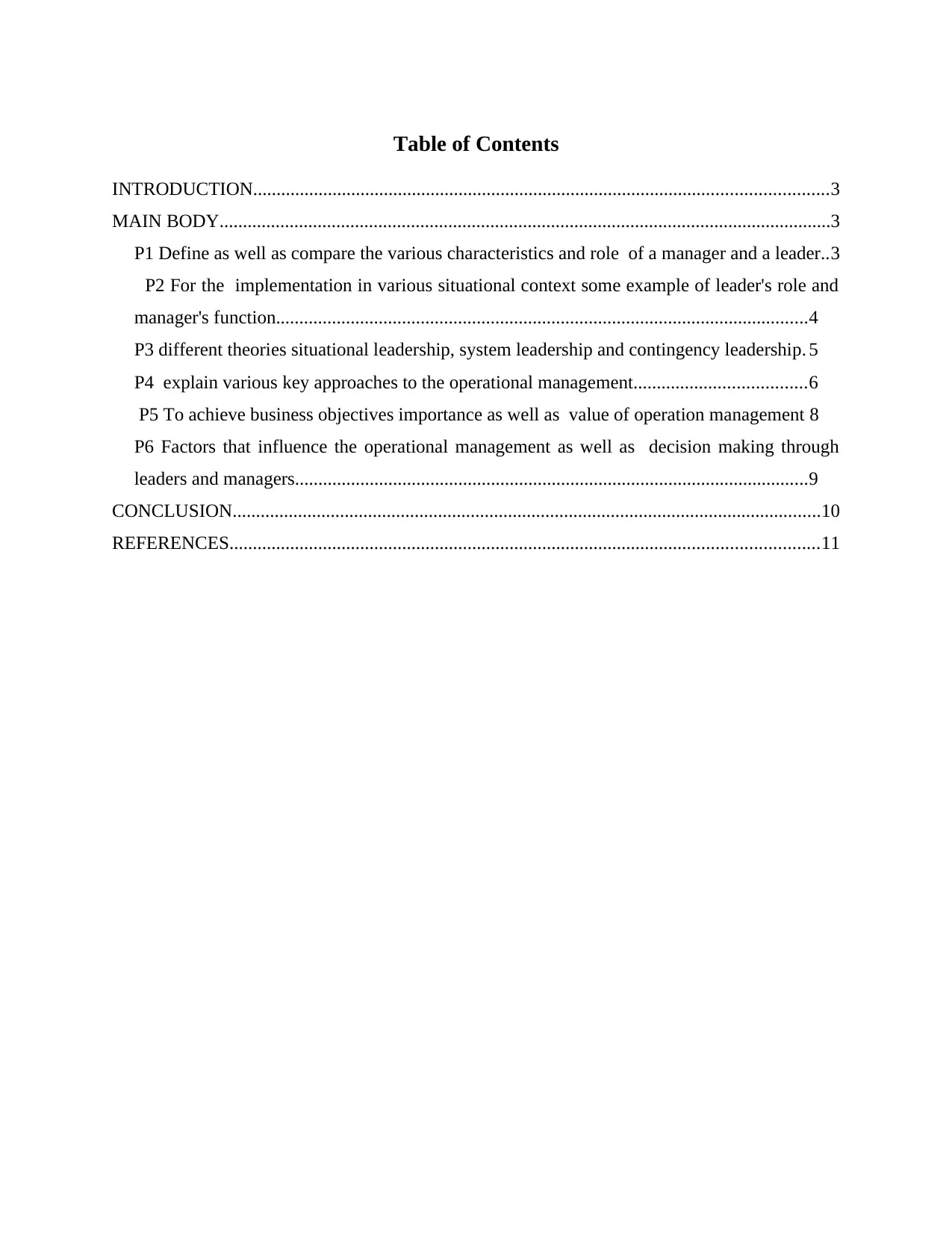
Table of Contents
INTRODUCTION...........................................................................................................................3
MAIN BODY...................................................................................................................................3
P1 Define as well as compare the various characteristics and role of a manager and a leader..3
P2 For the implementation in various situational context some example of leader's role and
manager's function..................................................................................................................4
P3 different theories situational leadership, system leadership and contingency leadership. 5
P4 explain various key approaches to the operational management.....................................6
P5 To achieve business objectives importance as well as value of operation management 8
P6 Factors that influence the operational management as well as decision making through
leaders and managers..............................................................................................................9
CONCLUSION..............................................................................................................................10
REFERENCES..............................................................................................................................11
INTRODUCTION...........................................................................................................................3
MAIN BODY...................................................................................................................................3
P1 Define as well as compare the various characteristics and role of a manager and a leader..3
P2 For the implementation in various situational context some example of leader's role and
manager's function..................................................................................................................4
P3 different theories situational leadership, system leadership and contingency leadership. 5
P4 explain various key approaches to the operational management.....................................6
P5 To achieve business objectives importance as well as value of operation management 8
P6 Factors that influence the operational management as well as decision making through
leaders and managers..............................................................................................................9
CONCLUSION..............................................................................................................................10
REFERENCES..............................................................................................................................11
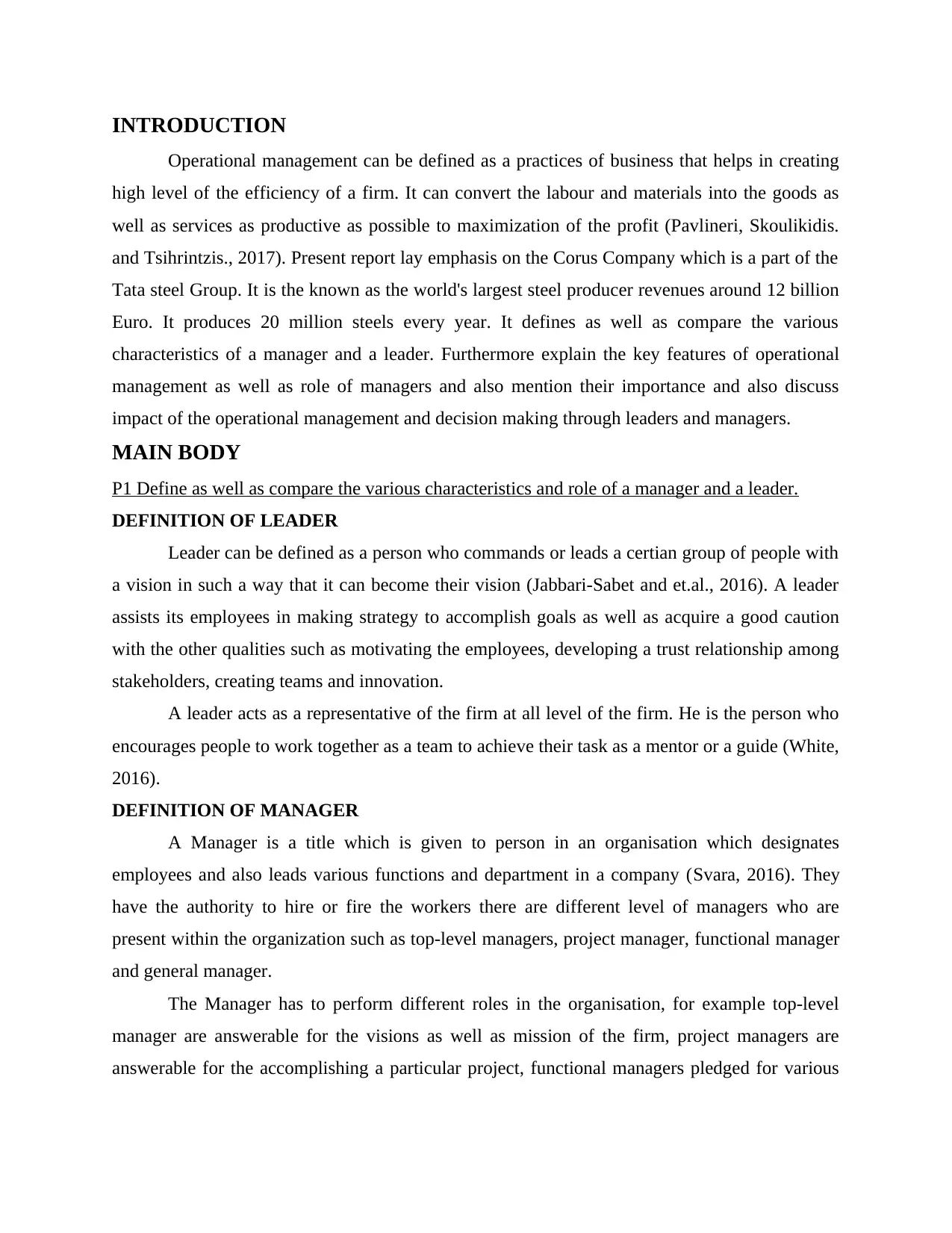
INTRODUCTION
Operational management can be defined as a practices of business that helps in creating
high level of the efficiency of a firm. It can convert the labour and materials into the goods as
well as services as productive as possible to maximization of the profit (Pavlineri, Skoulikidis.
and Tsihrintzis., 2017). Present report lay emphasis on the Corus Company which is a part of the
Tata steel Group. It is the known as the world's largest steel producer revenues around 12 billion
Euro. It produces 20 million steels every year. It defines as well as compare the various
characteristics of a manager and a leader. Furthermore explain the key features of operational
management as well as role of managers and also mention their importance and also discuss
impact of the operational management and decision making through leaders and managers.
MAIN BODY
P1 Define as well as compare the various characteristics and role of a manager and a leader.
DEFINITION OF LEADER
Leader can be defined as a person who commands or leads a certian group of people with
a vision in such a way that it can become their vision (Jabbari-Sabet and et.al., 2016). A leader
assists its employees in making strategy to accomplish goals as well as acquire a good caution
with the other qualities such as motivating the employees, developing a trust relationship among
stakeholders, creating teams and innovation.
A leader acts as a representative of the firm at all level of the firm. He is the person who
encourages people to work together as a team to achieve their task as a mentor or a guide (White,
2016).
DEFINITION OF MANAGER
A Manager is a title which is given to person in an organisation which designates
employees and also leads various functions and department in a company (Svara, 2016). They
have the authority to hire or fire the workers there are different level of managers who are
present within the organization such as top-level managers, project manager, functional manager
and general manager.
The Manager has to perform different roles in the organisation, for example top-level
manager are answerable for the visions as well as mission of the firm, project managers are
answerable for the accomplishing a particular project, functional managers pledged for various
Operational management can be defined as a practices of business that helps in creating
high level of the efficiency of a firm. It can convert the labour and materials into the goods as
well as services as productive as possible to maximization of the profit (Pavlineri, Skoulikidis.
and Tsihrintzis., 2017). Present report lay emphasis on the Corus Company which is a part of the
Tata steel Group. It is the known as the world's largest steel producer revenues around 12 billion
Euro. It produces 20 million steels every year. It defines as well as compare the various
characteristics of a manager and a leader. Furthermore explain the key features of operational
management as well as role of managers and also mention their importance and also discuss
impact of the operational management and decision making through leaders and managers.
MAIN BODY
P1 Define as well as compare the various characteristics and role of a manager and a leader.
DEFINITION OF LEADER
Leader can be defined as a person who commands or leads a certian group of people with
a vision in such a way that it can become their vision (Jabbari-Sabet and et.al., 2016). A leader
assists its employees in making strategy to accomplish goals as well as acquire a good caution
with the other qualities such as motivating the employees, developing a trust relationship among
stakeholders, creating teams and innovation.
A leader acts as a representative of the firm at all level of the firm. He is the person who
encourages people to work together as a team to achieve their task as a mentor or a guide (White,
2016).
DEFINITION OF MANAGER
A Manager is a title which is given to person in an organisation which designates
employees and also leads various functions and department in a company (Svara, 2016). They
have the authority to hire or fire the workers there are different level of managers who are
present within the organization such as top-level managers, project manager, functional manager
and general manager.
The Manager has to perform different roles in the organisation, for example top-level
manager are answerable for the visions as well as mission of the firm, project managers are
answerable for the accomplishing a particular project, functional managers pledged for various
⊘ This is a preview!⊘
Do you want full access?
Subscribe today to unlock all pages.

Trusted by 1+ million students worldwide
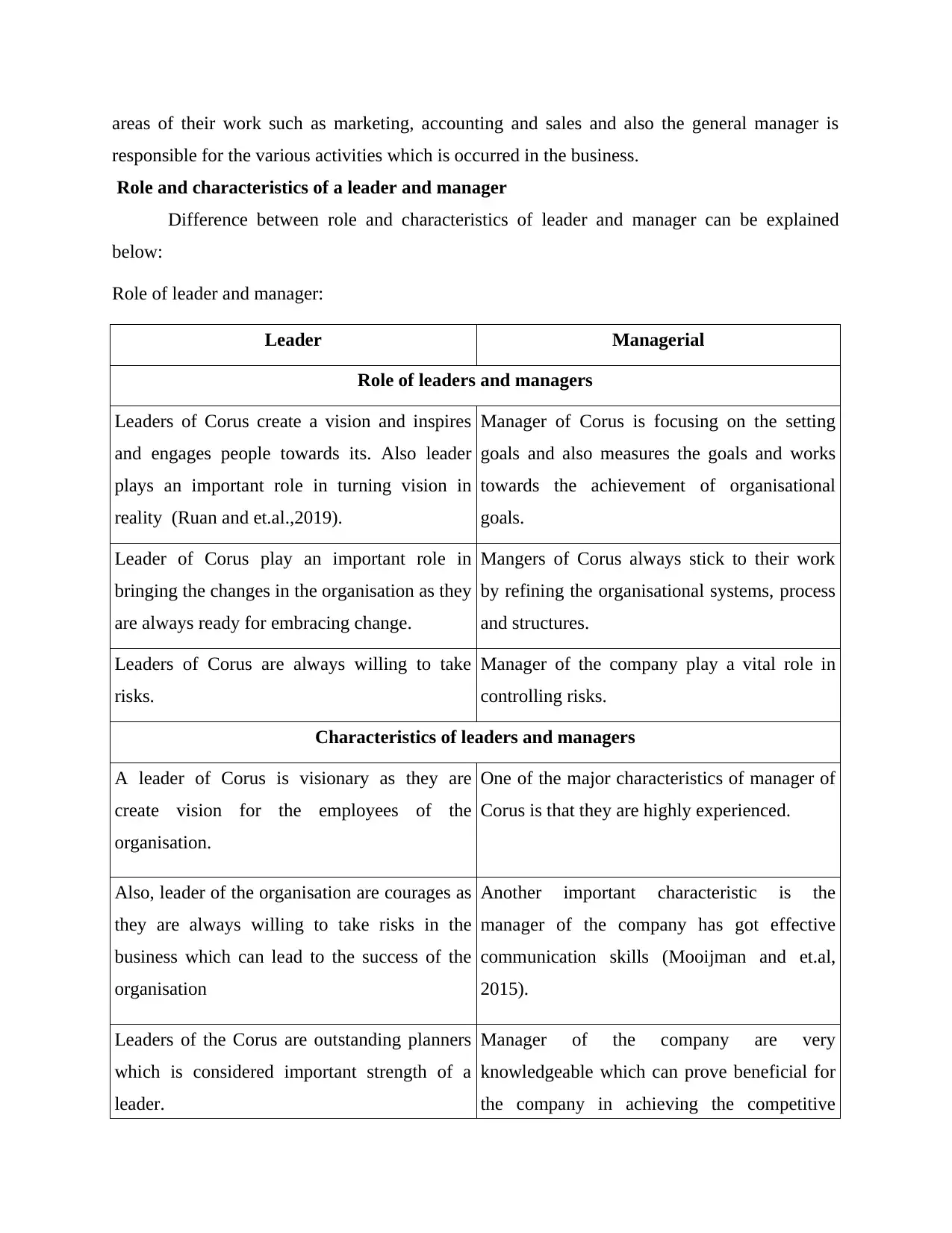
areas of their work such as marketing, accounting and sales and also the general manager is
responsible for the various activities which is occurred in the business.
Role and characteristics of a leader and manager
Difference between role and characteristics of leader and manager can be explained
below:
Role of leader and manager:
Leader Managerial
Role of leaders and managers
Leaders of Corus create a vision and inspires
and engages people towards its. Also leader
plays an important role in turning vision in
reality (Ruan and et.al.,2019).
Manager of Corus is focusing on the setting
goals and also measures the goals and works
towards the achievement of organisational
goals.
Leader of Corus play an important role in
bringing the changes in the organisation as they
are always ready for embracing change.
Mangers of Corus always stick to their work
by refining the organisational systems, process
and structures.
Leaders of Corus are always willing to take
risks.
Manager of the company play a vital role in
controlling risks.
Characteristics of leaders and managers
A leader of Corus is visionary as they are
create vision for the employees of the
organisation.
One of the major characteristics of manager of
Corus is that they are highly experienced.
Also, leader of the organisation are courages as
they are always willing to take risks in the
business which can lead to the success of the
organisation
Another important characteristic is the
manager of the company has got effective
communication skills (Mooijman and et.al,
2015).
Leaders of the Corus are outstanding planners
which is considered important strength of a
leader.
Manager of the company are very
knowledgeable which can prove beneficial for
the company in achieving the competitive
responsible for the various activities which is occurred in the business.
Role and characteristics of a leader and manager
Difference between role and characteristics of leader and manager can be explained
below:
Role of leader and manager:
Leader Managerial
Role of leaders and managers
Leaders of Corus create a vision and inspires
and engages people towards its. Also leader
plays an important role in turning vision in
reality (Ruan and et.al.,2019).
Manager of Corus is focusing on the setting
goals and also measures the goals and works
towards the achievement of organisational
goals.
Leader of Corus play an important role in
bringing the changes in the organisation as they
are always ready for embracing change.
Mangers of Corus always stick to their work
by refining the organisational systems, process
and structures.
Leaders of Corus are always willing to take
risks.
Manager of the company play a vital role in
controlling risks.
Characteristics of leaders and managers
A leader of Corus is visionary as they are
create vision for the employees of the
organisation.
One of the major characteristics of manager of
Corus is that they are highly experienced.
Also, leader of the organisation are courages as
they are always willing to take risks in the
business which can lead to the success of the
organisation
Another important characteristic is the
manager of the company has got effective
communication skills (Mooijman and et.al,
2015).
Leaders of the Corus are outstanding planners
which is considered important strength of a
leader.
Manager of the company are very
knowledgeable which can prove beneficial for
the company in achieving the competitive
Paraphrase This Document
Need a fresh take? Get an instant paraphrase of this document with our AI Paraphraser
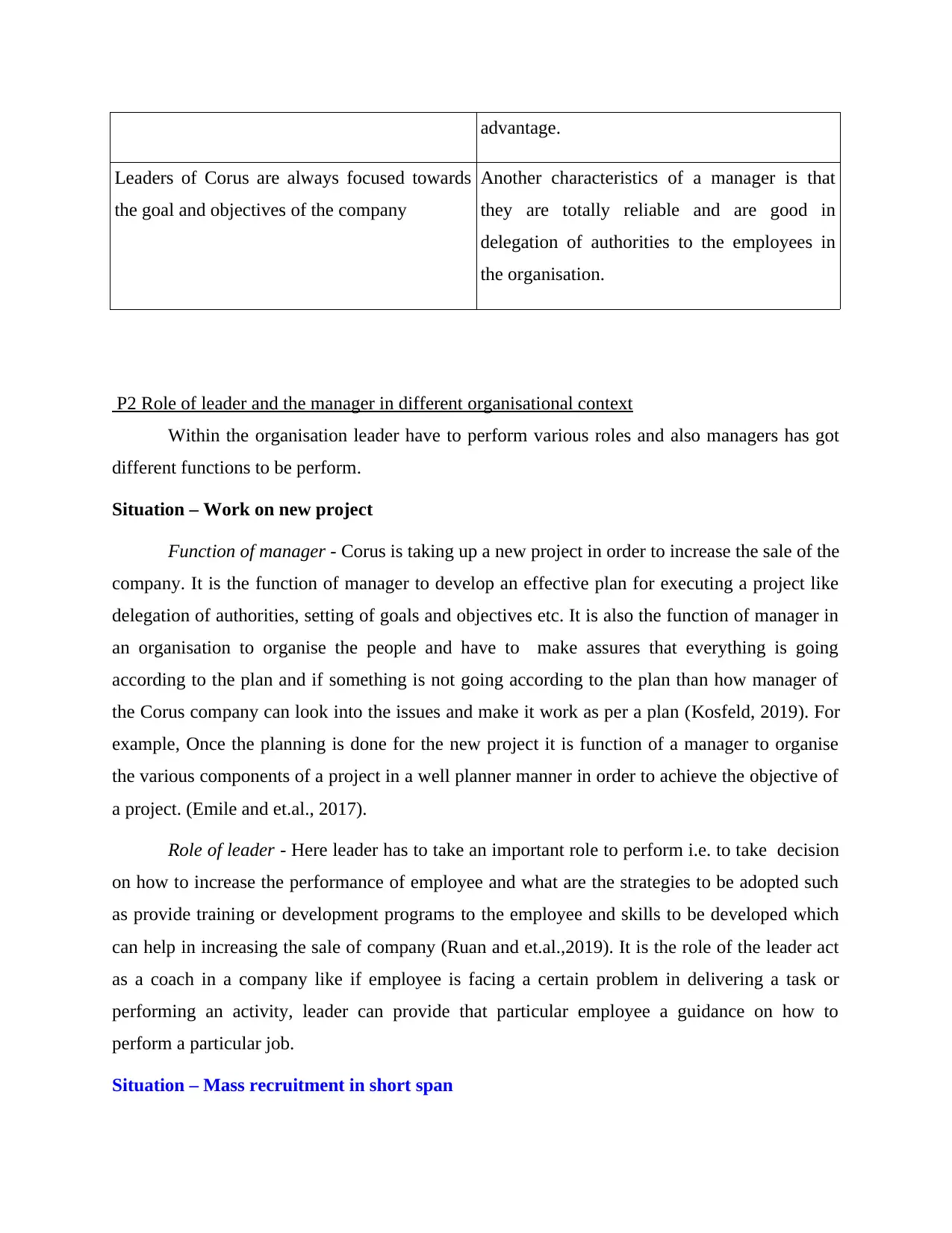
advantage.
Leaders of Corus are always focused towards
the goal and objectives of the company
Another characteristics of a manager is that
they are totally reliable and are good in
delegation of authorities to the employees in
the organisation.
P2 Role of leader and the manager in different organisational context
Within the organisation leader have to perform various roles and also managers has got
different functions to be perform.
Situation – Work on new project
Function of manager - Corus is taking up a new project in order to increase the sale of the
company. It is the function of manager to develop an effective plan for executing a project like
delegation of authorities, setting of goals and objectives etc. It is also the function of manager in
an organisation to organise the people and have to make assures that everything is going
according to the plan and if something is not going according to the plan than how manager of
the Corus company can look into the issues and make it work as per a plan (Kosfeld, 2019). For
example, Once the planning is done for the new project it is function of a manager to organise
the various components of a project in a well planner manner in order to achieve the objective of
a project. (Emile and et.al., 2017).
Role of leader - Here leader has to take an important role to perform i.e. to take decision
on how to increase the performance of employee and what are the strategies to be adopted such
as provide training or development programs to the employee and skills to be developed which
can help in increasing the sale of company (Ruan and et.al.,2019). It is the role of the leader act
as a coach in a company like if employee is facing a certain problem in delivering a task or
performing an activity, leader can provide that particular employee a guidance on how to
perform a particular job.
Situation – Mass recruitment in short span
Leaders of Corus are always focused towards
the goal and objectives of the company
Another characteristics of a manager is that
they are totally reliable and are good in
delegation of authorities to the employees in
the organisation.
P2 Role of leader and the manager in different organisational context
Within the organisation leader have to perform various roles and also managers has got
different functions to be perform.
Situation – Work on new project
Function of manager - Corus is taking up a new project in order to increase the sale of the
company. It is the function of manager to develop an effective plan for executing a project like
delegation of authorities, setting of goals and objectives etc. It is also the function of manager in
an organisation to organise the people and have to make assures that everything is going
according to the plan and if something is not going according to the plan than how manager of
the Corus company can look into the issues and make it work as per a plan (Kosfeld, 2019). For
example, Once the planning is done for the new project it is function of a manager to organise
the various components of a project in a well planner manner in order to achieve the objective of
a project. (Emile and et.al., 2017).
Role of leader - Here leader has to take an important role to perform i.e. to take decision
on how to increase the performance of employee and what are the strategies to be adopted such
as provide training or development programs to the employee and skills to be developed which
can help in increasing the sale of company (Ruan and et.al.,2019). It is the role of the leader act
as a coach in a company like if employee is facing a certain problem in delivering a task or
performing an activity, leader can provide that particular employee a guidance on how to
perform a particular job.
Situation – Mass recruitment in short span
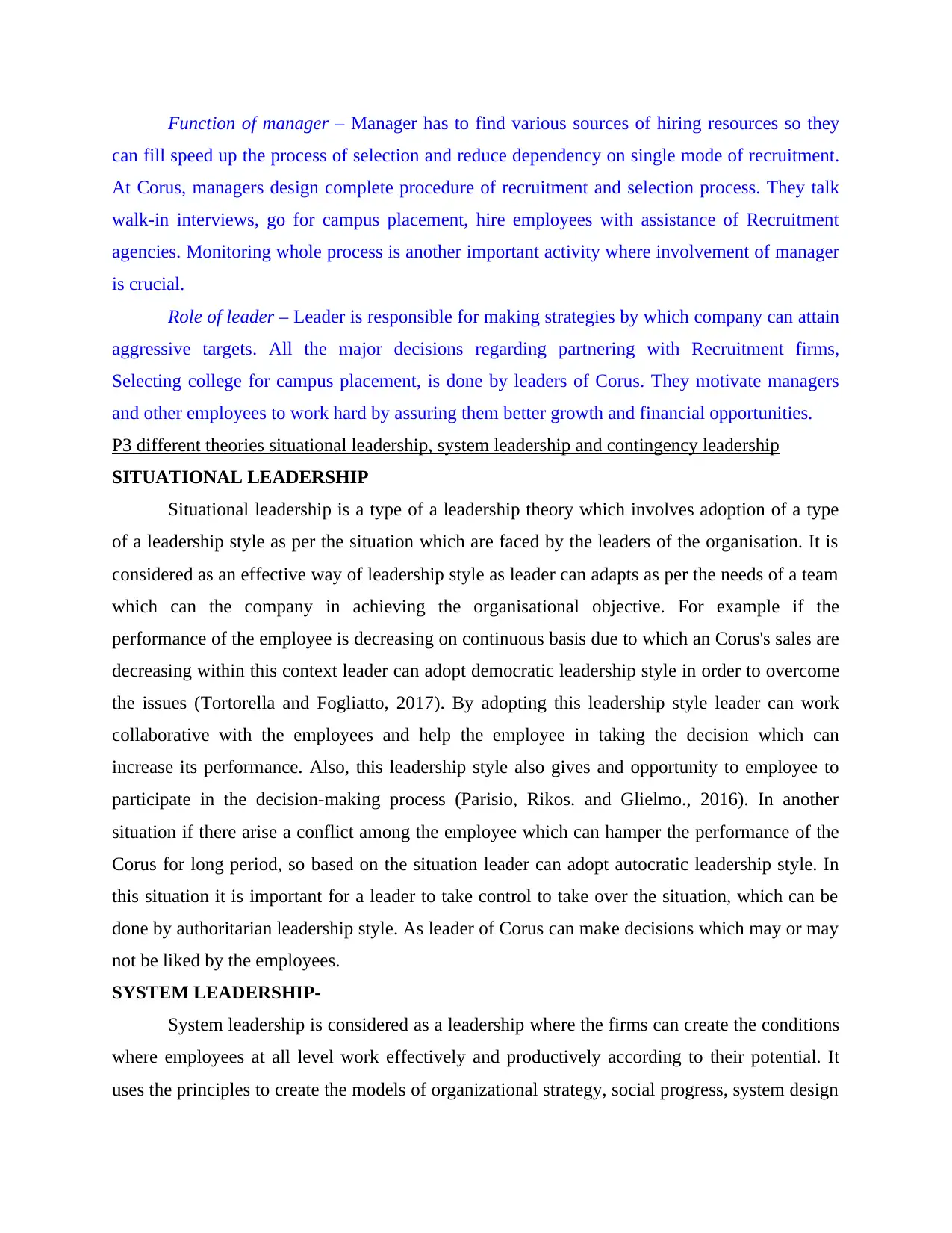
Function of manager – Manager has to find various sources of hiring resources so they
can fill speed up the process of selection and reduce dependency on single mode of recruitment.
At Corus, managers design complete procedure of recruitment and selection process. They talk
walk-in interviews, go for campus placement, hire employees with assistance of Recruitment
agencies. Monitoring whole process is another important activity where involvement of manager
is crucial.
Role of leader – Leader is responsible for making strategies by which company can attain
aggressive targets. All the major decisions regarding partnering with Recruitment firms,
Selecting college for campus placement, is done by leaders of Corus. They motivate managers
and other employees to work hard by assuring them better growth and financial opportunities.
P3 different theories situational leadership, system leadership and contingency leadership
SITUATIONAL LEADERSHIP
Situational leadership is a type of a leadership theory which involves adoption of a type
of a leadership style as per the situation which are faced by the leaders of the organisation. It is
considered as an effective way of leadership style as leader can adapts as per the needs of a team
which can the company in achieving the organisational objective. For example if the
performance of the employee is decreasing on continuous basis due to which an Corus's sales are
decreasing within this context leader can adopt democratic leadership style in order to overcome
the issues (Tortorella and Fogliatto, 2017). By adopting this leadership style leader can work
collaborative with the employees and help the employee in taking the decision which can
increase its performance. Also, this leadership style also gives and opportunity to employee to
participate in the decision-making process (Parisio, Rikos. and Glielmo., 2016). In another
situation if there arise a conflict among the employee which can hamper the performance of the
Corus for long period, so based on the situation leader can adopt autocratic leadership style. In
this situation it is important for a leader to take control to take over the situation, which can be
done by authoritarian leadership style. As leader of Corus can make decisions which may or may
not be liked by the employees.
SYSTEM LEADERSHIP-
System leadership is considered as a leadership where the firms can create the conditions
where employees at all level work effectively and productively according to their potential. It
uses the principles to create the models of organizational strategy, social progress, system design
can fill speed up the process of selection and reduce dependency on single mode of recruitment.
At Corus, managers design complete procedure of recruitment and selection process. They talk
walk-in interviews, go for campus placement, hire employees with assistance of Recruitment
agencies. Monitoring whole process is another important activity where involvement of manager
is crucial.
Role of leader – Leader is responsible for making strategies by which company can attain
aggressive targets. All the major decisions regarding partnering with Recruitment firms,
Selecting college for campus placement, is done by leaders of Corus. They motivate managers
and other employees to work hard by assuring them better growth and financial opportunities.
P3 different theories situational leadership, system leadership and contingency leadership
SITUATIONAL LEADERSHIP
Situational leadership is a type of a leadership theory which involves adoption of a type
of a leadership style as per the situation which are faced by the leaders of the organisation. It is
considered as an effective way of leadership style as leader can adapts as per the needs of a team
which can the company in achieving the organisational objective. For example if the
performance of the employee is decreasing on continuous basis due to which an Corus's sales are
decreasing within this context leader can adopt democratic leadership style in order to overcome
the issues (Tortorella and Fogliatto, 2017). By adopting this leadership style leader can work
collaborative with the employees and help the employee in taking the decision which can
increase its performance. Also, this leadership style also gives and opportunity to employee to
participate in the decision-making process (Parisio, Rikos. and Glielmo., 2016). In another
situation if there arise a conflict among the employee which can hamper the performance of the
Corus for long period, so based on the situation leader can adopt autocratic leadership style. In
this situation it is important for a leader to take control to take over the situation, which can be
done by authoritarian leadership style. As leader of Corus can make decisions which may or may
not be liked by the employees.
SYSTEM LEADERSHIP-
System leadership is considered as a leadership where the firms can create the conditions
where employees at all level work effectively and productively according to their potential. It
uses the principles to create the models of organizational strategy, social progress, system design
⊘ This is a preview!⊘
Do you want full access?
Subscribe today to unlock all pages.

Trusted by 1+ million students worldwide
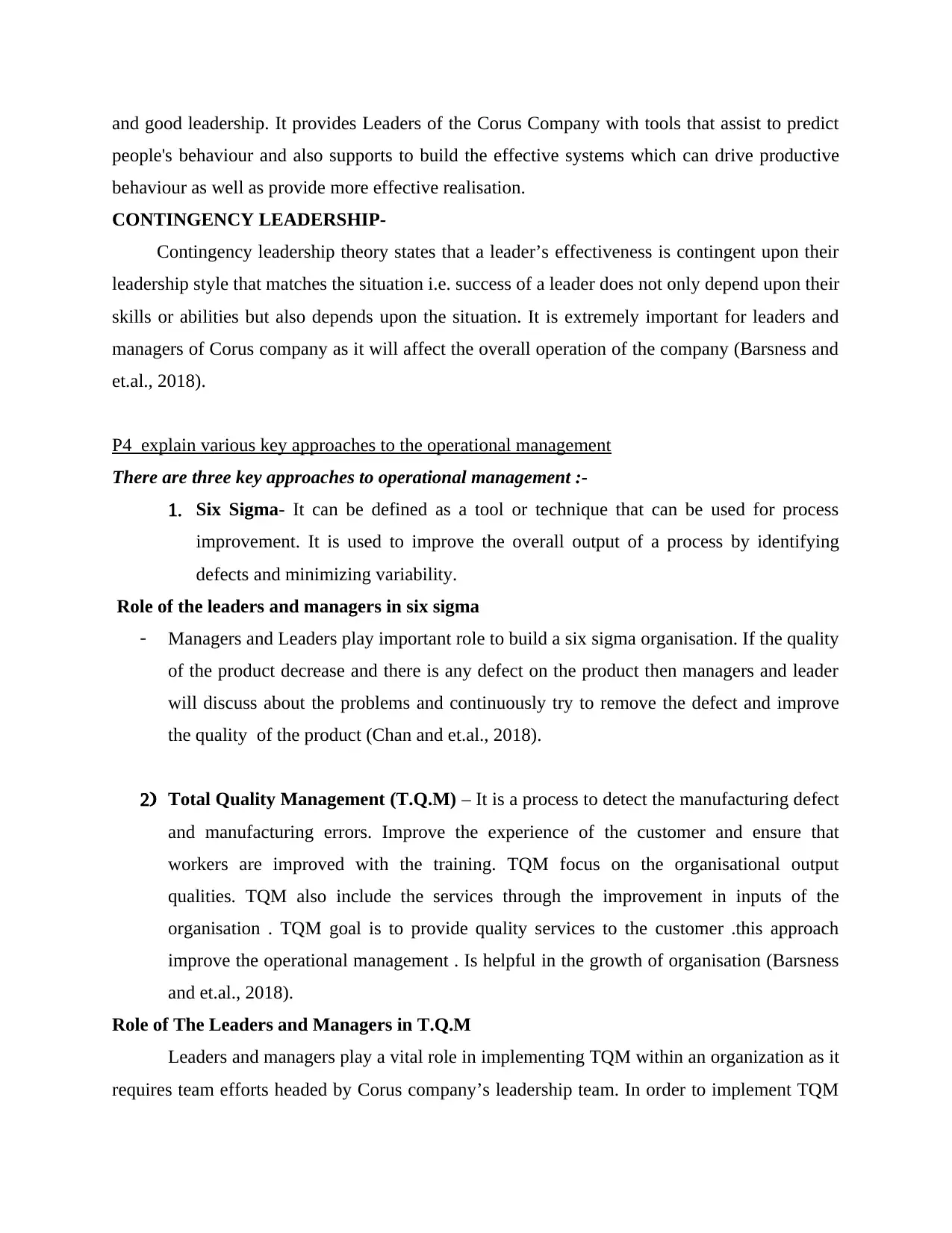
and good leadership. It provides Leaders of the Corus Company with tools that assist to predict
people's behaviour and also supports to build the effective systems which can drive productive
behaviour as well as provide more effective realisation.
CONTINGENCY LEADERSHIP-
Contingency leadership theory states that a leader’s effectiveness is contingent upon their
leadership style that matches the situation i.e. success of a leader does not only depend upon their
skills or abilities but also depends upon the situation. It is extremely important for leaders and
managers of Corus company as it will affect the overall operation of the company (Barsness and
et.al., 2018).
P4 explain various key approaches to the operational management
There are three key approaches to operational management :-
1. Six Sigma- It can be defined as a tool or technique that can be used for process
improvement. It is used to improve the overall output of a process by identifying
defects and minimizing variability.
Role of the leaders and managers in six sigma
Managers and Leaders play important role to build a six sigma organisation. If the quality
of the product decrease and there is any defect on the product then managers and leader
will discuss about the problems and continuously try to remove the defect and improve
the quality of the product (Chan and et.al., 2018).
2) Total Quality Management (T.Q.M) – It is a process to detect the manufacturing defect
and manufacturing errors. Improve the experience of the customer and ensure that
workers are improved with the training. TQM focus on the organisational output
qualities. TQM also include the services through the improvement in inputs of the
organisation . TQM goal is to provide quality services to the customer .this approach
improve the operational management . Is helpful in the growth of organisation (Barsness
and et.al., 2018).
Role of The Leaders and Managers in T.Q.M
Leaders and managers play a vital role in implementing TQM within an organization as it
requires team efforts headed by Corus company’s leadership team. In order to implement TQM
people's behaviour and also supports to build the effective systems which can drive productive
behaviour as well as provide more effective realisation.
CONTINGENCY LEADERSHIP-
Contingency leadership theory states that a leader’s effectiveness is contingent upon their
leadership style that matches the situation i.e. success of a leader does not only depend upon their
skills or abilities but also depends upon the situation. It is extremely important for leaders and
managers of Corus company as it will affect the overall operation of the company (Barsness and
et.al., 2018).
P4 explain various key approaches to the operational management
There are three key approaches to operational management :-
1. Six Sigma- It can be defined as a tool or technique that can be used for process
improvement. It is used to improve the overall output of a process by identifying
defects and minimizing variability.
Role of the leaders and managers in six sigma
Managers and Leaders play important role to build a six sigma organisation. If the quality
of the product decrease and there is any defect on the product then managers and leader
will discuss about the problems and continuously try to remove the defect and improve
the quality of the product (Chan and et.al., 2018).
2) Total Quality Management (T.Q.M) – It is a process to detect the manufacturing defect
and manufacturing errors. Improve the experience of the customer and ensure that
workers are improved with the training. TQM focus on the organisational output
qualities. TQM also include the services through the improvement in inputs of the
organisation . TQM goal is to provide quality services to the customer .this approach
improve the operational management . Is helpful in the growth of organisation (Barsness
and et.al., 2018).
Role of The Leaders and Managers in T.Q.M
Leaders and managers play a vital role in implementing TQM within an organization as it
requires team efforts headed by Corus company’s leadership team. In order to implement TQM
Paraphrase This Document
Need a fresh take? Get an instant paraphrase of this document with our AI Paraphraser
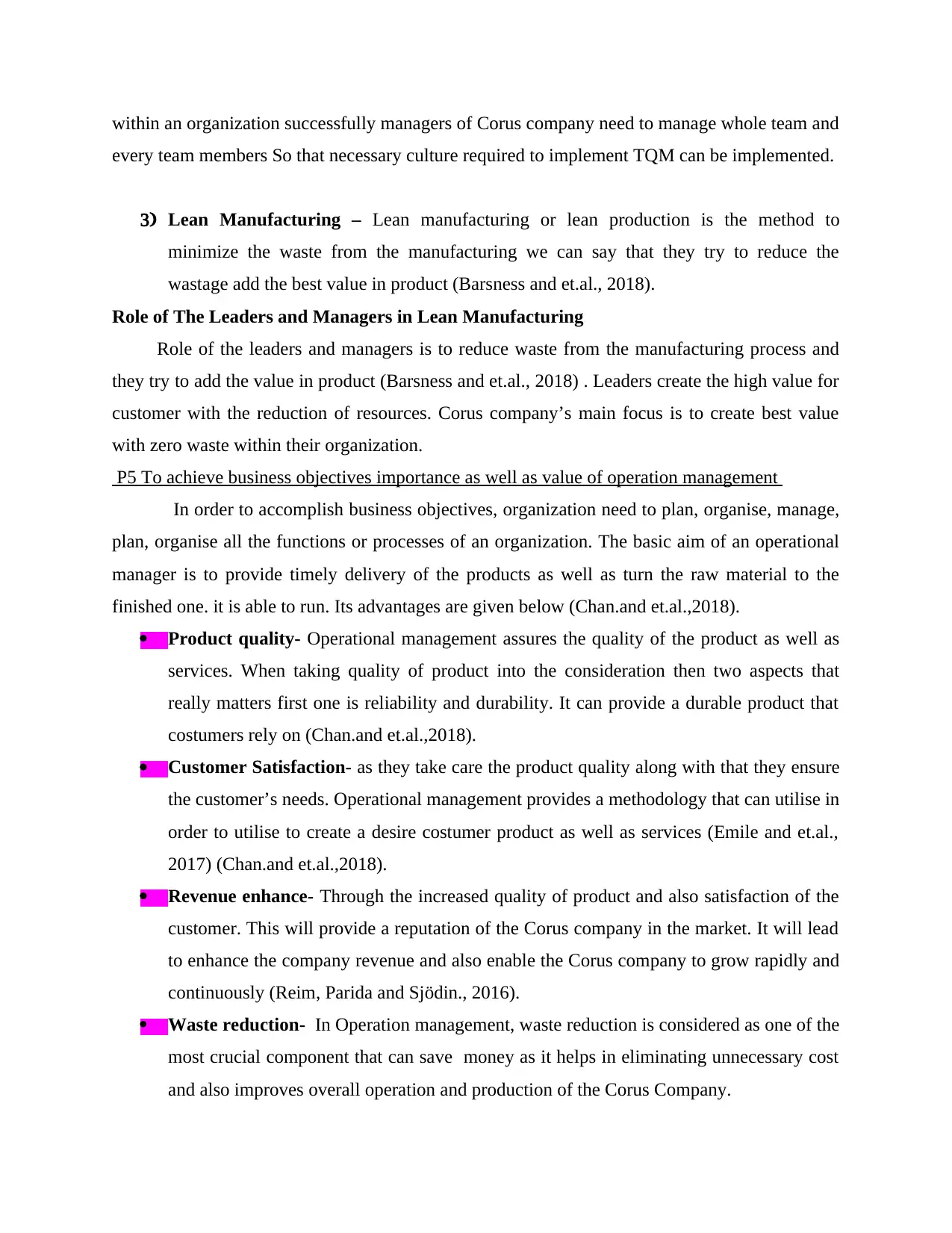
within an organization successfully managers of Corus company need to manage whole team and
every team members So that necessary culture required to implement TQM can be implemented.
3) Lean Manufacturing – Lean manufacturing or lean production is the method to
minimize the waste from the manufacturing we can say that they try to reduce the
wastage add the best value in product (Barsness and et.al., 2018).
Role of The Leaders and Managers in Lean Manufacturing
Role of the leaders and managers is to reduce waste from the manufacturing process and
they try to add the value in product (Barsness and et.al., 2018) . Leaders create the high value for
customer with the reduction of resources. Corus company’s main focus is to create best value
with zero waste within their organization.
P5 To achieve business objectives importance as well as value of operation management
In order to accomplish business objectives, organization need to plan, organise, manage,
plan, organise all the functions or processes of an organization. The basic aim of an operational
manager is to provide timely delivery of the products as well as turn the raw material to the
finished one. it is able to run. Its advantages are given below (Chan.and et.al.,2018).
Product quality- Operational management assures the quality of the product as well as
services. When taking quality of product into the consideration then two aspects that
really matters first one is reliability and durability. It can provide a durable product that
costumers rely on (Chan.and et.al.,2018).
Customer Satisfaction- as they take care the product quality along with that they ensure
the customer’s needs. Operational management provides a methodology that can utilise in
order to utilise to create a desire costumer product as well as services (Emile and et.al.,
2017) (Chan.and et.al.,2018).
Revenue enhance- Through the increased quality of product and also satisfaction of the
customer. This will provide a reputation of the Corus company in the market. It will lead
to enhance the company revenue and also enable the Corus company to grow rapidly and
continuously (Reim, Parida and Sjödin., 2016).
Waste reduction- In Operation management, waste reduction is considered as one of the
most crucial component that can save money as it helps in eliminating unnecessary cost
and also improves overall operation and production of the Corus Company.
every team members So that necessary culture required to implement TQM can be implemented.
3) Lean Manufacturing – Lean manufacturing or lean production is the method to
minimize the waste from the manufacturing we can say that they try to reduce the
wastage add the best value in product (Barsness and et.al., 2018).
Role of The Leaders and Managers in Lean Manufacturing
Role of the leaders and managers is to reduce waste from the manufacturing process and
they try to add the value in product (Barsness and et.al., 2018) . Leaders create the high value for
customer with the reduction of resources. Corus company’s main focus is to create best value
with zero waste within their organization.
P5 To achieve business objectives importance as well as value of operation management
In order to accomplish business objectives, organization need to plan, organise, manage,
plan, organise all the functions or processes of an organization. The basic aim of an operational
manager is to provide timely delivery of the products as well as turn the raw material to the
finished one. it is able to run. Its advantages are given below (Chan.and et.al.,2018).
Product quality- Operational management assures the quality of the product as well as
services. When taking quality of product into the consideration then two aspects that
really matters first one is reliability and durability. It can provide a durable product that
costumers rely on (Chan.and et.al.,2018).
Customer Satisfaction- as they take care the product quality along with that they ensure
the customer’s needs. Operational management provides a methodology that can utilise in
order to utilise to create a desire costumer product as well as services (Emile and et.al.,
2017) (Chan.and et.al.,2018).
Revenue enhance- Through the increased quality of product and also satisfaction of the
customer. This will provide a reputation of the Corus company in the market. It will lead
to enhance the company revenue and also enable the Corus company to grow rapidly and
continuously (Reim, Parida and Sjödin., 2016).
Waste reduction- In Operation management, waste reduction is considered as one of the
most crucial component that can save money as it helps in eliminating unnecessary cost
and also improves overall operation and production of the Corus Company.
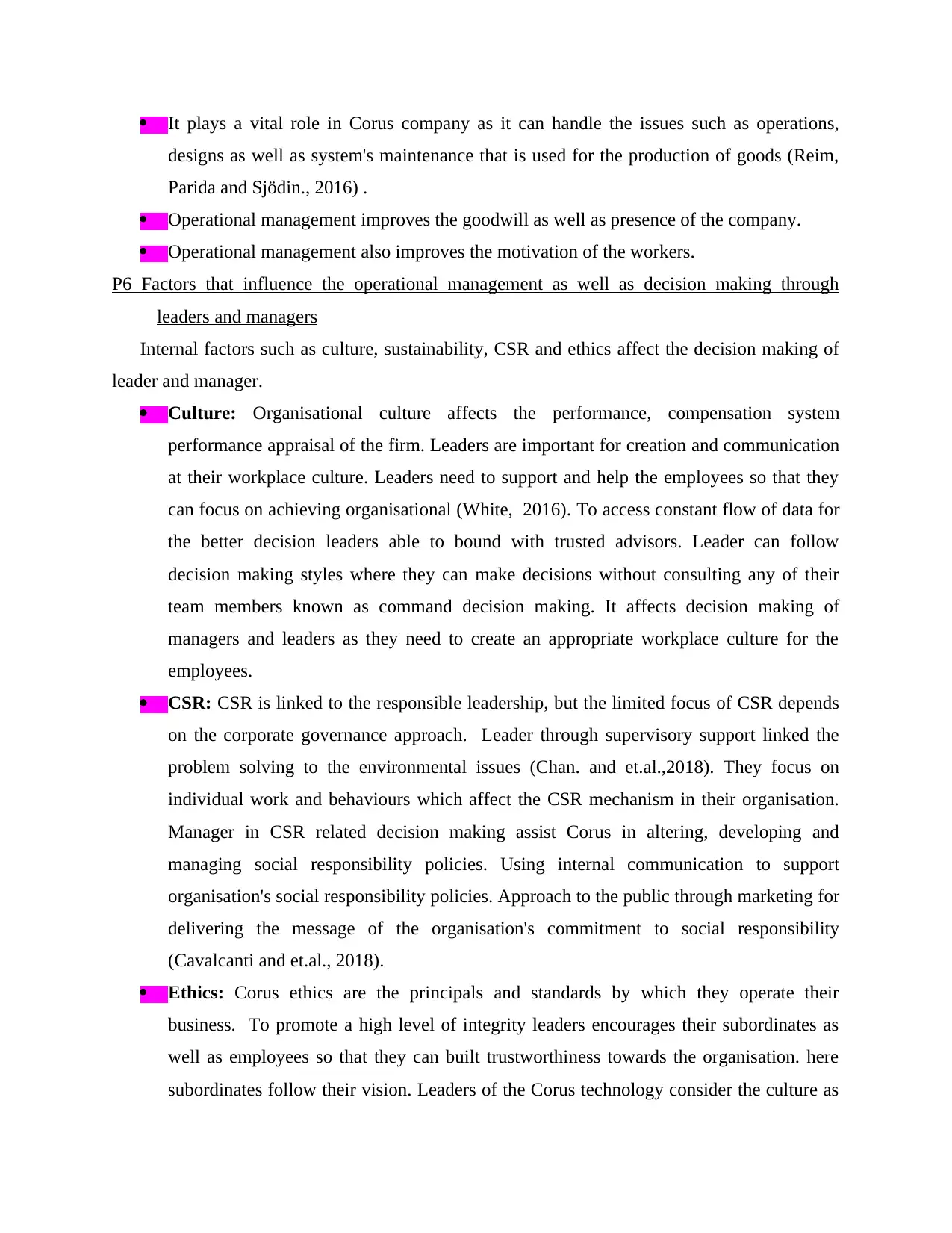
It plays a vital role in Corus company as it can handle the issues such as operations,
designs as well as system's maintenance that is used for the production of goods (Reim,
Parida and Sjödin., 2016) .
Operational management improves the goodwill as well as presence of the company.
Operational management also improves the motivation of the workers.
P6 Factors that influence the operational management as well as decision making through
leaders and managers
Internal factors such as culture, sustainability, CSR and ethics affect the decision making of
leader and manager.
Culture: Organisational culture affects the performance, compensation system
performance appraisal of the firm. Leaders are important for creation and communication
at their workplace culture. Leaders need to support and help the employees so that they
can focus on achieving organisational (White, 2016). To access constant flow of data for
the better decision leaders able to bound with trusted advisors. Leader can follow
decision making styles where they can make decisions without consulting any of their
team members known as command decision making. It affects decision making of
managers and leaders as they need to create an appropriate workplace culture for the
employees.
CSR: CSR is linked to the responsible leadership, but the limited focus of CSR depends
on the corporate governance approach. Leader through supervisory support linked the
problem solving to the environmental issues (Chan. and et.al.,2018). They focus on
individual work and behaviours which affect the CSR mechanism in their organisation.
Manager in CSR related decision making assist Corus in altering, developing and
managing social responsibility policies. Using internal communication to support
organisation's social responsibility policies. Approach to the public through marketing for
delivering the message of the organisation's commitment to social responsibility
(Cavalcanti and et.al., 2018).
Ethics: Corus ethics are the principals and standards by which they operate their
business. To promote a high level of integrity leaders encourages their subordinates as
well as employees so that they can built trustworthiness towards the organisation. here
subordinates follow their vision. Leaders of the Corus technology consider the culture as
designs as well as system's maintenance that is used for the production of goods (Reim,
Parida and Sjödin., 2016) .
Operational management improves the goodwill as well as presence of the company.
Operational management also improves the motivation of the workers.
P6 Factors that influence the operational management as well as decision making through
leaders and managers
Internal factors such as culture, sustainability, CSR and ethics affect the decision making of
leader and manager.
Culture: Organisational culture affects the performance, compensation system
performance appraisal of the firm. Leaders are important for creation and communication
at their workplace culture. Leaders need to support and help the employees so that they
can focus on achieving organisational (White, 2016). To access constant flow of data for
the better decision leaders able to bound with trusted advisors. Leader can follow
decision making styles where they can make decisions without consulting any of their
team members known as command decision making. It affects decision making of
managers and leaders as they need to create an appropriate workplace culture for the
employees.
CSR: CSR is linked to the responsible leadership, but the limited focus of CSR depends
on the corporate governance approach. Leader through supervisory support linked the
problem solving to the environmental issues (Chan. and et.al.,2018). They focus on
individual work and behaviours which affect the CSR mechanism in their organisation.
Manager in CSR related decision making assist Corus in altering, developing and
managing social responsibility policies. Using internal communication to support
organisation's social responsibility policies. Approach to the public through marketing for
delivering the message of the organisation's commitment to social responsibility
(Cavalcanti and et.al., 2018).
Ethics: Corus ethics are the principals and standards by which they operate their
business. To promote a high level of integrity leaders encourages their subordinates as
well as employees so that they can built trustworthiness towards the organisation. here
subordinates follow their vision. Leaders of the Corus technology consider the culture as
⊘ This is a preview!⊘
Do you want full access?
Subscribe today to unlock all pages.

Trusted by 1+ million students worldwide
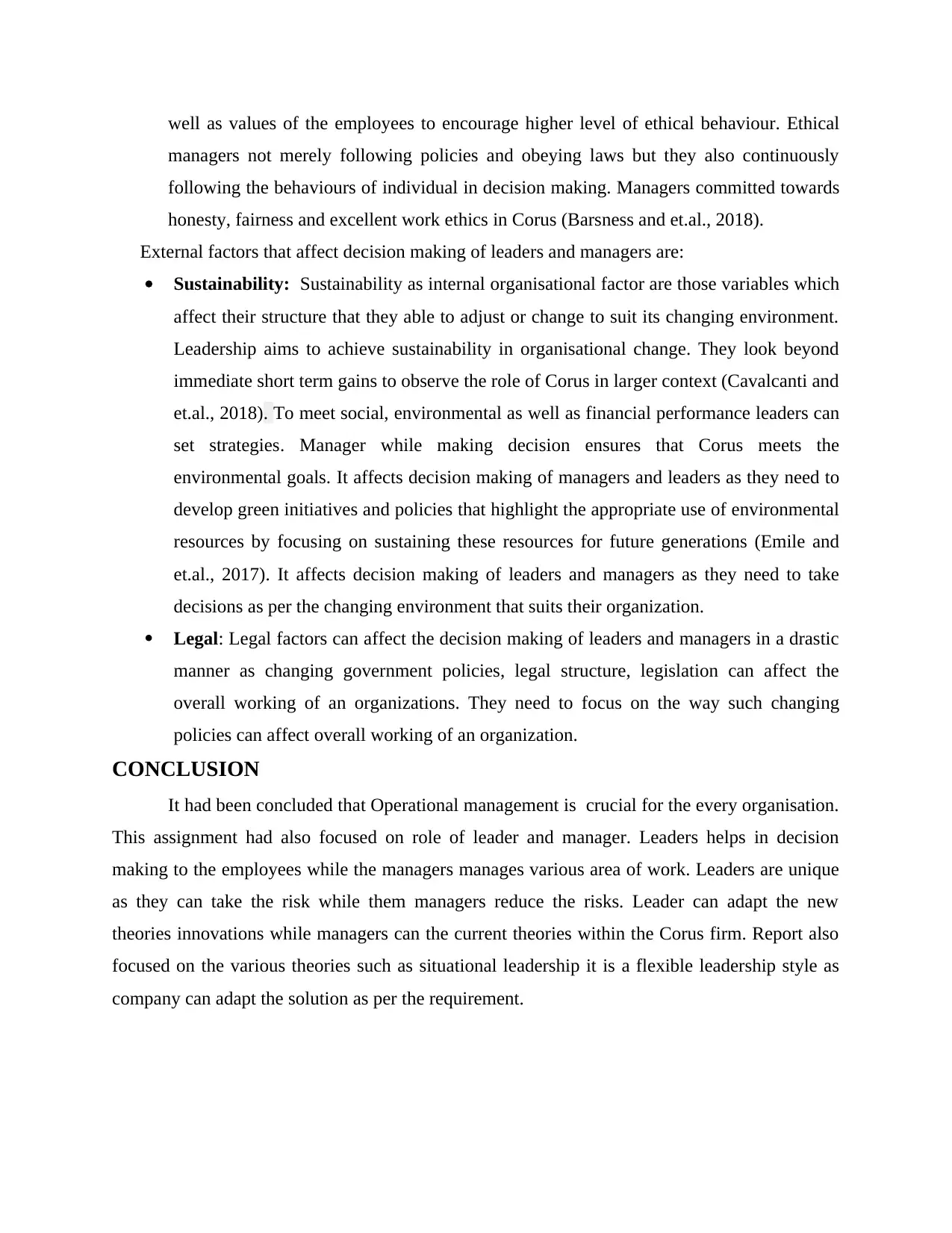
well as values of the employees to encourage higher level of ethical behaviour. Ethical
managers not merely following policies and obeying laws but they also continuously
following the behaviours of individual in decision making. Managers committed towards
honesty, fairness and excellent work ethics in Corus (Barsness and et.al., 2018).
External factors that affect decision making of leaders and managers are:
Sustainability: Sustainability as internal organisational factor are those variables which
affect their structure that they able to adjust or change to suit its changing environment.
Leadership aims to achieve sustainability in organisational change. They look beyond
immediate short term gains to observe the role of Corus in larger context (Cavalcanti and
et.al., 2018). To meet social, environmental as well as financial performance leaders can
set strategies. Manager while making decision ensures that Corus meets the
environmental goals. It affects decision making of managers and leaders as they need to
develop green initiatives and policies that highlight the appropriate use of environmental
resources by focusing on sustaining these resources for future generations (Emile and
et.al., 2017). It affects decision making of leaders and managers as they need to take
decisions as per the changing environment that suits their organization.
Legal: Legal factors can affect the decision making of leaders and managers in a drastic
manner as changing government policies, legal structure, legislation can affect the
overall working of an organizations. They need to focus on the way such changing
policies can affect overall working of an organization.
CONCLUSION
It had been concluded that Operational management is crucial for the every organisation.
This assignment had also focused on role of leader and manager. Leaders helps in decision
making to the employees while the managers manages various area of work. Leaders are unique
as they can take the risk while them managers reduce the risks. Leader can adapt the new
theories innovations while managers can the current theories within the Corus firm. Report also
focused on the various theories such as situational leadership it is a flexible leadership style as
company can adapt the solution as per the requirement.
managers not merely following policies and obeying laws but they also continuously
following the behaviours of individual in decision making. Managers committed towards
honesty, fairness and excellent work ethics in Corus (Barsness and et.al., 2018).
External factors that affect decision making of leaders and managers are:
Sustainability: Sustainability as internal organisational factor are those variables which
affect their structure that they able to adjust or change to suit its changing environment.
Leadership aims to achieve sustainability in organisational change. They look beyond
immediate short term gains to observe the role of Corus in larger context (Cavalcanti and
et.al., 2018). To meet social, environmental as well as financial performance leaders can
set strategies. Manager while making decision ensures that Corus meets the
environmental goals. It affects decision making of managers and leaders as they need to
develop green initiatives and policies that highlight the appropriate use of environmental
resources by focusing on sustaining these resources for future generations (Emile and
et.al., 2017). It affects decision making of leaders and managers as they need to take
decisions as per the changing environment that suits their organization.
Legal: Legal factors can affect the decision making of leaders and managers in a drastic
manner as changing government policies, legal structure, legislation can affect the
overall working of an organizations. They need to focus on the way such changing
policies can affect overall working of an organization.
CONCLUSION
It had been concluded that Operational management is crucial for the every organisation.
This assignment had also focused on role of leader and manager. Leaders helps in decision
making to the employees while the managers manages various area of work. Leaders are unique
as they can take the risk while them managers reduce the risks. Leader can adapt the new
theories innovations while managers can the current theories within the Corus firm. Report also
focused on the various theories such as situational leadership it is a flexible leadership style as
company can adapt the solution as per the requirement.
Paraphrase This Document
Need a fresh take? Get an instant paraphrase of this document with our AI Paraphraser

1 out of 11
Related Documents
Your All-in-One AI-Powered Toolkit for Academic Success.
+13062052269
info@desklib.com
Available 24*7 on WhatsApp / Email
![[object Object]](/_next/static/media/star-bottom.7253800d.svg)
Unlock your academic potential
Copyright © 2020–2026 A2Z Services. All Rights Reserved. Developed and managed by ZUCOL.





